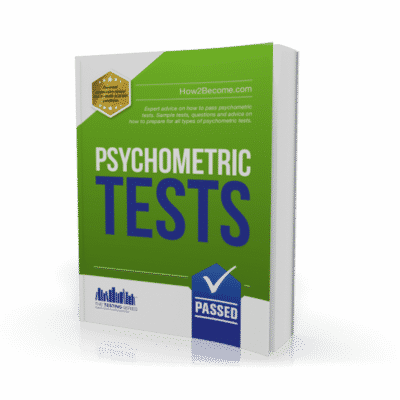Psychometric tests have become more frequent in job selection processes. Psychometric tests allow employers to assess candidates based on their skills, knowledge and personality; essential to maintaining a strong workforce.
In this blog, I am going to provide 8 top tips for passing psychometric tests. Use these top tips for passing psychometric tests to help you prepare for ANY job selection process. No matter what psychometric test you are undergoing, these tips will prove invaluable.
8 TOP TIPS FOR PASSING PSYCHOMETRIC TESTS

To begin with, you should first know what the employer is looking for. When you are seeking to fill a job position, and psychometric tests are going to be used, it is important that you know what the employer wants from their potential employees.
This is a top tip for passing psychometric tests because it will make sure that you have fully understood what skills and attributes are required for the job position.
Generally, the job description and person specification is a FANTASTIC way to gain an insight into what the employers are looking for.

The second top tip for passing psychometric tests is knowing what type of psychometric test you will be sitting.
As you can imagine, psychometric tests are used in a vast array of job selection processes. These tests can vary from anything to testing your mathematical knowledge to mechanical concepts.
Below is a list of the different psychometric tests that you may be assessed on:
- Numerical Reasoning
- Verbal Reasoning
- Mechanical Comprehension
- Electrical Comprehension
- Non-Verbal Reasoning
- Concentration Tests
- Fault Analysis Tests
For more information on these different types of assessments, with practice questions for you to try out, please check out our Youtube channel, CAREERVIDZ. For more top tips for passing psychometric tests, don’t forget to watch the FULL VIDEO on this page to help you prepare for any psychometric test.


The third top tip for passing psychometric tests is to practice speed as well as your accuracy. Psychometric tests are primarily used to not only assess your mind-set, but to determine your proficiency and speed.
Whilst this tip is imperative for high scores during any psychometric test, I cannot stress enough how important it is to be accurate. Yes you are trying to work as quickly as you can, but you don’t want your answers to suffer. Careless mistakes will cost you easy marks.
That is why you want to work on your accuracy AND your speed. Employers want to see that you are knowledgeable and possess the correct qualities, but they also want to make sure that you are an efficient worker, who is able to manage high-pressured situations.

Statistics show that people who maintain a healthy lifestyle are far more likely to succeed in a psychometric test.
There are four main areas that you should remember when trying to excel in your performance:
- Ensure that you are eating the correct foods. Maintain a balanced diet. Consume a healthy breakfast.
- Ensure that you receive a good nights’ sleep. People who receive a good nights’ sleep are far more likely to perform at their best.
- Exercising on a regular basis will ensure that you not only maintain a healthy, active lifestyle, but exercise will also reduce stress.
- Drink plenty of water! Drinking coffee or alcoholic drinks slows down your performance, so you want to make sure you are fully hydrated prior to your assessment.

The more practice you undergo, the better you will perform during a psychometric test. As with any type of assessment, it is important that you are prepared for each type of psychometric testing
question.
We have a whole range of psychometric testing questions which you can try out for FREE. Simply click on the following link to access your free psychometric testing questions.

Whilst you may be required to sit a numerical reasoning psychometric test, you can still benefit and increase your scores by practising other psychometric tests. For example, a numerical reasoning test is likely to assess your ability to concentrate on lots of information.
Practising a range of psychometric tests will definitely improve your overall intelligence.
If you don’t know what type of tests you will be facing, then I highly recommend you practice as many type of questions as you can. If you do know what type of psychometric test, consider how else you will be assessed.

You may not have had to sit a test since your GCSEs or A-Levels, and therefore the thought of sitting an assessment can be off-putting and stressful.
When you undergo your preparation stages, make sure that you practice in a similar environment.
Here are a few things you could do to help you prepare for the testing environment:
- Minimise any distractions around you. Find yourself a quiet place to practice in.
- Ensure that you practice under timed conditions. This will improve your overall performance. The fact that psychometric tests are almost guaranteed to be assessed under harsh timed conditions, will ensure that you are ready to handle this constraint.
- Practice as many psychometric testing questions as you can. This will improve your overall intellect and mind-set.
- Give yourself plenty of breaks in between study sessions. Generally, 30-50 minutes of practising will be more beneficial alongside a 15 minute break, as opposed to working for hours and hours. Your mind will begin to switch off and you will start to see a decrease in your proficiency and concentration.


Finally, my last top tip for psychometric tests is to receive feedback. If you are not successful, you should ALWAYS try and receive feedback. This will help you to understand where you want wrong, which you can learn from for future reference. Generally, people who fail at this stage have not practiced for their assessments. That is why you should do on-going practice to ensure that you are fully prepared.
Psychometric tests need to be prepared for, and if you wish to gain the job position, you will want to do everything in your power to succeed!

HOW TO PASS PSYCHOMETRIC TESTS
For more advice, tips, practice questions and detailed answers, check out our psychometric testing guide!
Use these top tips for passing psychometric tests to help you prepare for any psychometric or aptitude test.


